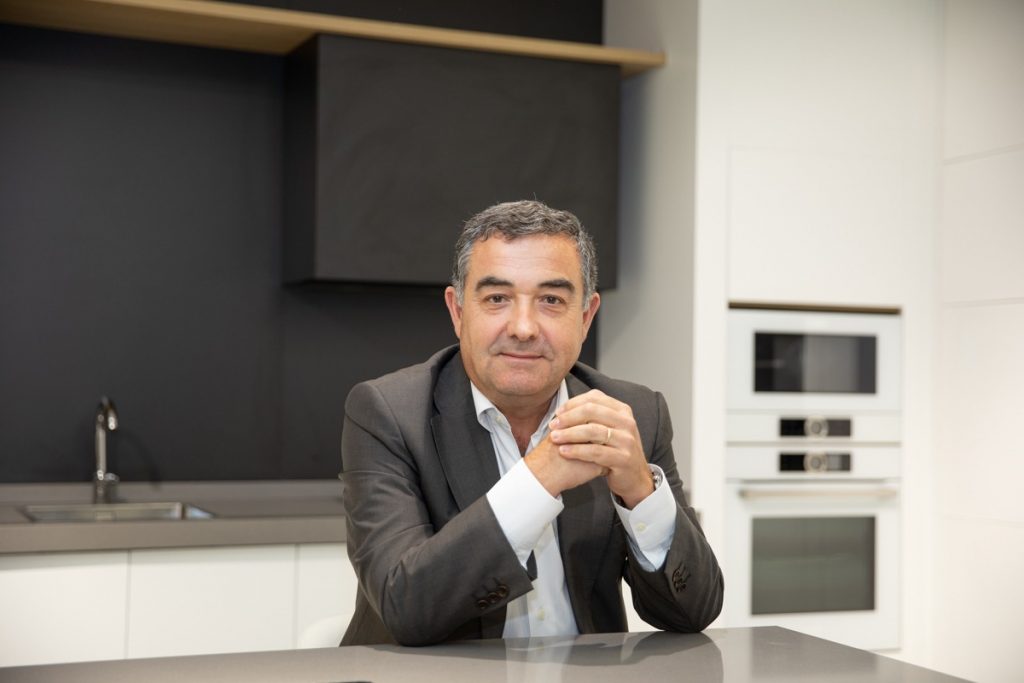
Since its arrival in Navarra in the 1970s, BSH has become one of the most emblematic companies in the region. Today the German group employs 4,400 people in Spain, of which nearly 1,200 work in the two production plants that the company has in the our region. In some technological aspects, these two production centers are among the most advanced of the multinational worldwide. We spoke with the company’s Chief Financial Officer in Spain, José Juste, who told to us that the factor that explains the company’s successful trajectory in our community since 1979 is being fully aware at all times of the powerful threat that a lack of efficiency and productivity could pose for the future of the company.
BSH is a German company that currently belongs to Bosh, but it originally arose from a joint venture between Bosh and Siemens. In 1979 the company arrived in Spain and took control of two companies: Balay and the former SAFEL.
SAFEL had two factories in Navarra and one in Santander. In Navarra, the company produced gas heaters and had just started up a new factory in Eskiroz, south of Pamplona, where it produced refrigerators. This was an acquisition that fitted in very well with the rest of the business in Spain because Balay was producing dishwashers, washing machines and kitchen appliances in Zaragoza. Overall, they felt that they could offer a very balanced product range in Spain.
The most remarkable thing is that, from the beginning, the company relied on the people who worked in the previous companies. The first measures they adopted were to reinforce the areas that best complemented the rest of the company, incorporating new products, but, as I say, always considering that the internal capacity we had, the human capital, was good enough to continue developing the company.
Well, this is a really difficult question to answer because in the last year the company has expanded a lot in Poland, Turkey and other countries. In addition, there are plans to build new factories in Egypt and probably some more in Eastern Europe. These expansions can always jeopardize the volume and activity in some well-established factories in the so-called high-cost countries like Germany, Spain, etc.
But, in this respect, what is really important is that we remain competitive. Being competitive in a high-cost country requires adopting and implementing new technologies to have an excellent production system, excellent processes and committed and talented people. These are the aspects that we must reinforce in order to remain relevant in the future. In any case, it is obvious that in a multinational like ours the decision centers are not local, so there is a risk that the commitment to a country may change.
Overall, the activity in household appliances has been strengthened rather than diminished because families have saved and have had to stay much longer at home, so they have not spent on leisure time. Also, by having to stay in our homes, we all saw that there were some things that could be changed to be more comfortable. All these factors have caused the demand for household appliances to increase during the pandemic. And now we are suffering, like all businesses, material shortages, especially in electronics, high transportation costs, material cost increases… We will to see if in the future this causes changes multinationals’ footprints because this new situation will force us to think about shorter supply chains. If materials have to come from Asia, for example, this could lead to a problem in deliveries instead of the advantage it was in the past.
I think the ecosystem is well established. But an innovation ecosystem cannot cover the whole spectrum of knowledge that our company may need. So there are areas where our company can find regional counterparts to develop research and collaborations, but it is not enough in all cases, so we also have collaborations with external partners, including companies, technology centers or universities outside Navarra. But, overall, I see that in our community there is more and more collaboration between companies, centers and universities, and we also have a very good umbrella from the Government of Navarra.
I think the ecosystem is adequate. You can get qualified people, although it is not always easy, and we have access to an adequate network of suppliers, which perhaps does not fully cover the needs, but the industry is sufficiently diverse. Access to universities is adequate. The connection with the institutions, with the Administration, is fine, in my opinion it is not so complex. So operating in Navarra offers a very accessible ecosystem for companies.
I am a supporter and promoter of collaboration. I believe that in the current context, the only possibility to operate beyond the limits imposed by our own resources is to collaborate, and not limit ourselves to just contracting or buying services or products to suppliers.
It is very enriching when, in a generous way, we collaborate among companies to share successful experiences. And the raison d’être of organizations like AIN or other institutions in Navarra that bring together different companies is to reinforce this spirit of collaboration.
Navarre’s industry is suffering like the rest of the industries in the country or in Europe. We have said it several times. We have talked a lot about VUCA, but now we have a VUCA++ situation because several factors have come together. We now suffer from shortages of materials, rising transportation costs, which have tripled or quintupled in cost, rising costs of materials and energy. We are no different from the rest and we are affected by the context.
Anyway, instead of focusing on the current situation, I think it is preferable that we reflect on what we can do differently in Navarre. And I think we should locate more activities here that are now being done abroad. It is not something that can be done in the short term and in an easy way, but it is a challenge that institutions like SODENA and others could face. In addition, I believe that we have to develop more and more quickly solutions aimed at energy efficiency and sustainable energy production.
The current situation is not easy, but I think we could overcome it well if we are able to visualize the future based on the development of our own capabilities.
I feel fully Navarre because I have been living here for many years and I have always been very satisfied here. My son lives in Madrid and I can say that it is not comparable to live in a big metropolis than in a city like Pamplona or its surroundings, where you can move around quickly and you can solve most of your needs very easily.
In this sense, I would say that living in Navarra is an excellent opportunity to live comfortably and enjoy a good quality of life.
Well, for me this is very difficult to answer because I think the response will depend on each multinational company. In our case, I would say that we compete permanently with other external agents and we do it based on creativity, ideas and innovation.
And I think this is the right formula, because if you get too comfortable you will most likely disappear. The only option is to assume that we operate in a world where outside Navarra or Spain we have a lot of competent people cheaper than us and willing to take on our activity to develop it in their country. The right thing to do is to feel a bit insecure, to work permanently to improve what we do, whatever it is. In our case, the ecosystem where we are is an enabler to keep doing that continuous work.

